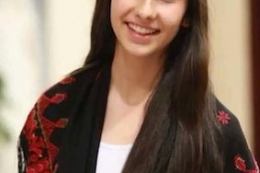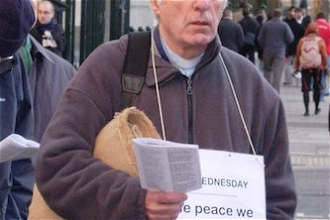Holy Land: What do Christians feel about Hamas?
There is something quite surreal about being in a place and seeing that same place on television news - looking completely different. A few days ago at a hotel in Bethlehem I watched CNN reports from a town down the road, where I had just been, showing scene after scene of four young Moslems burning flags and firing guns in protest at the cartoons of Mohamed. This was followed by an interview with a young Christian girl coming out of Sunday Mass at the Church of the Nativity, which I had also just visited, saying how scared she was that Hamas might win the election, introduce Sharia law and force her to wear a veil. These same hypnotic clips were shown over and over again - and I had to shake myself to remember that the election had already happened and so these scenes were nearly a week old. Both places shown on the TV news seemed quiet when I was there. Downstairs a cheerful-looking party of Israeli Palestinians from Haifa - several families with lots of children clutching their toys - had arrived to spend the weekend seeing the holy sites. During my stay I spoke with a number of Christians in Israel and the Palestinian Territories. Here are some of their comments: Brother Joseph Lowenstein, in charge of special projects at Bethlehem University (he has worked there for 24 years), said: "I feel perfectly safe here. I felt much more nervous during the siege of the Church of the Nativity when we had trigger-happy young soldiers camped in the university taking pot shots at the statue of Our Lady - and rockets were being fired at us from the settlement over there. He pointed at a hill on the other side of the town. "One rocket went right through our library. Thankfully no one was hurt but we lost many books." "I don't believe Hamas has any intention of imposing Sharia Law on Christians. I know many Christians who voted for them. It was a protest vote because Fata had been so corrupt. Hamas is very conscious of the Christians' presence and the need to protect it." Fr Jamal Khader, Chair of Religious Studies at Bethlehem University (a post established by Basil Hume), later echoed these views on a BBC report, concluding: "They are not terrorists. Their main agenda is social issues. The main issue is the occupation - not this party." Speaking about the position of Christians under Hamas, Dr Mitri Raheb, director of the Bethlehem International Centre, said in a statement: "My answer is that we are called not to be afraid; neither to panic nor to withdraw from the public sphere. We are called not to feel as if we are just spectators but rather to participate with many in this quest for a new Palestinian identity. We are called to replace old and ineffective structures by engaging in this process of building a new political system that is modern, meaningful, and accountable. In a context of commercialising religion, we are called to provide a new sense of deep spirituality. And in a context of disorientation, our vocation is to offer the vision of a new promise and of dynamic identity. This is not only a challenge, but an honour and a privilege to be able to participate. It is at times like these that we are most needed." A businessman from Bethlehem said: "Hamas did not start as a religious movement. Many Christians voted for them. 95% of aid went into the pockets of Fata. They were corrupt and many people were fed up with them. There is a strong movement among Palestinians for human rights so they would not allow fundamentalists to take over. Of course we are worried about the future. The economic situation could not be worse and we are being surrounded here in Bethlehem by the Wall. But I feel more hopeful after this election result. I remember a time when we were not allowed to fly the Palestinian flag. Women were shot for hanging laundry out in Palestinian colours." The Dean of St George's Anglican Cathedral, the Rev John Tidy, was more apprehensive, particularly about security issues after the publication of the cartoons. He said: "There was heavy security today as they feared the Imam might say something. I am afraid that this election result may accelerate the emigration of Christians. It is factually correct to say that Hamas is a secular organisation, but part of its declared policy is the introduction of Sharia law. In the local press many people have expressed their concerns about this. There is a deep sense of uncertainty." Father Awni, Melchite parish priest at the 'Synagogue Church' in Nazareth, said: "We are lucky. We live in Israel. Of course there is concern. But our big problem is emigration. It even makes the Pope very sad. The Moslems don't want us to leave. We are the salt of the earth here. The Arab Christian community in Israel and the occupied territory is small but still very influential in academia, business and society. We are all afraid they will impose Sharia law. We are afraid of persecution of our brothers and sisters. But we are a very strong people and have some articulate spokesmen to defend us. Many Christians voted for Hamas. The other party behaved in a very corrupt way. We are all hoping they will show themselves to be good politicians. The main message I would have for Christians is: Don't be afraid."


















